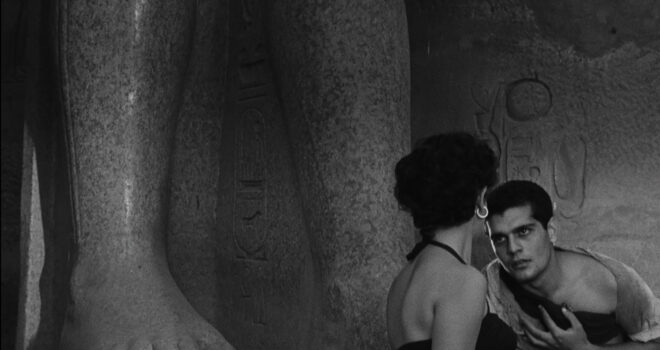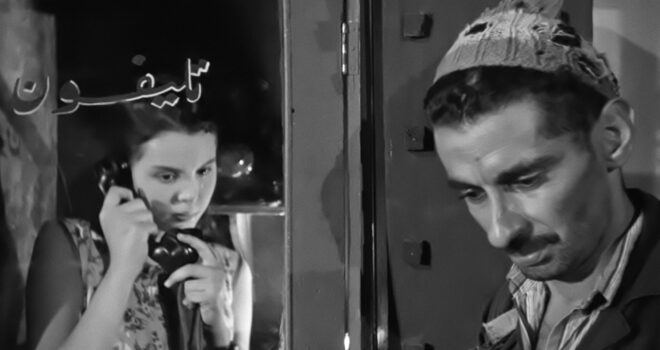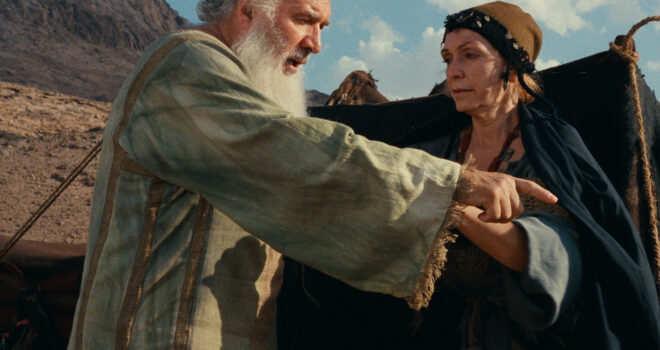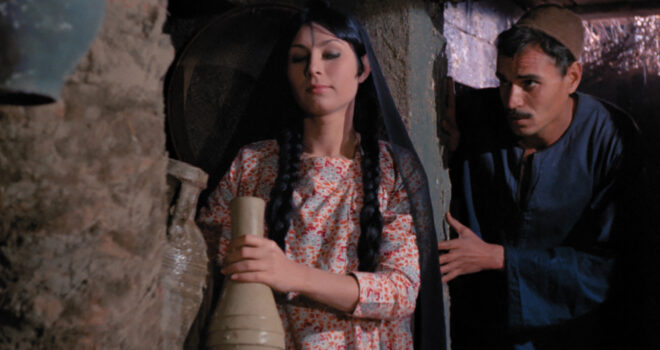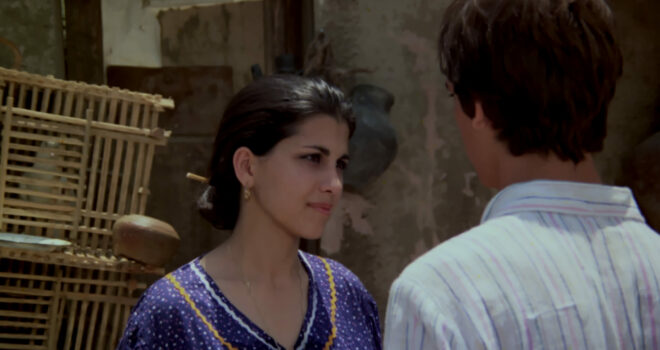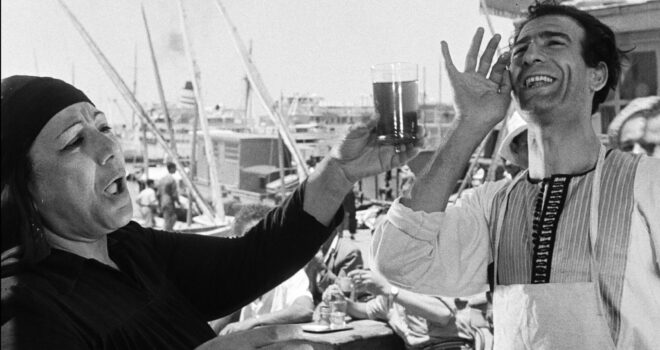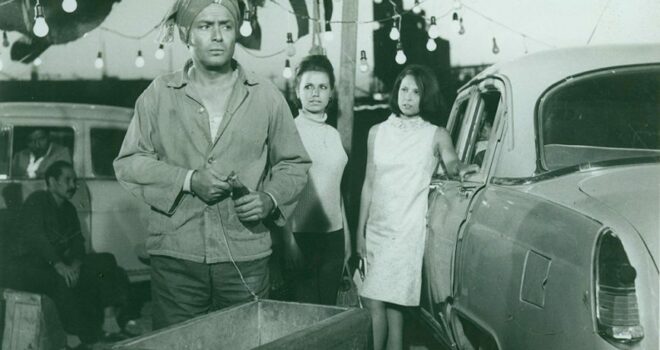As the centenary of his birth (1926–2008) approaches, the festival is proud to pay tribute to Egyptian director Youssef Chahine. Through eight films, the retrospective highlights the artistic commitment and modernity of a filmmaker whose work has had a profound impact on both Arab and world cinema, thanks to its longevity and aesthetic diversity. Alternately admired and controversial, but never resigned, Chahine’s passion for cinema reflected that of a country and its people.
In collaboration with Misr International Films.
Read the editorial
In Youssef Chahine’s cinema we find the strength of defiance — not only against fatality or resignation, but against any attempt to reduce Egypt to a static portrait. With each passing regime, be it a declining monarchy, Nasser’s socialist dreams, Sadat’s liberal mirages, then Moubarak’s authoritarian regimes or the resurgence of islamisation, Chahine films a country that repeatedly falls apart and begins anew. This defiance is a way of resisting: the state’s discourse, founding myths, conventional images of a nation trapped in its past or hostage to its present. For him, filmmaking becomes a gesture of life — defiance means re-opening reality, giving it back its voice, its plurality, its turbulence, faces and narratives.
From film to film, the same question haunts Chahine: how can you inhabit a world when it vacillates? The Egypt that he films is a living body, beset by the pains of its own birth into modernity. Be it rural folk struggling for water, dockworkers, outcasts at a train station or Alexandria’s dreamers, his characters are the moving figures of a nation in the making. Their gestures, their love stories, their revolts are both individual and collective — as if each destiny carried within it the fissure of a whole people.
Chahine’s cinema unfolds at the cross-roads of politics and the flesh. He never separates struggle from sensuality, conscience from passion. The camera espouses bodies as much as it auscultates the tensions running through them, capturing the fever of reality without ceding to the illusion of naturalness. Whereas other Egyptian filmmakers have filmed society from the fringes, Chahine films the fringes as the very centre of the world: a space of friction where the truth of social ties is revealed.
The legacy of Chahine’s cinema is not only linked to his subjects, but also to the way he orchestrates form. Its lyricism is less an excess than a method. Music, dance, light and dust form a dramaturgy of movement. Everything breathes, everything quivers: crowds, faces, landscapes. His mise en scène is nurtured by a tactile relationship to the world, by a stubborn faith in the vitality of gestures, and a very personal imagination. Cinema becomes an extension of life, a space where the chaos of emotions searches for its meaning.
This formal energy never excludes lucidity. Behind the songs and vital forces, Chahine inscribes the awareness of a fissure: between dreams and power, utopia and disillusionment. His films are those of a man who believed in the revolution, then saw hope unravel into compromise. Yet, he has never stopped believing in the gaze — in the capacity of cinema to keep the questions of possible futures alive, even amidst disaster. This tension between enthusiasm and bitterness gives his films a unique vibration. Neither naïve, nor cynical, often critical, in the fragile light they rely on a “why”, an ”again” and an “always”.
Chahine belongs to the generation for whom cinema was a way of writing history — not as a chronicle, but as a lived experience. He films an Egypt being invented under our eyes, with its conquests and deadlocks, its irreducible contradictions. Through social struggles, thwarted desires and political failures, he builds a narrative of Arab modernity in motion.
Yet, this history is never abstract. It appears in faces, the texture of earth, the wind blowing up dust. For Chahine, reality is always embodied. Even when raised to the level of myth or allegory, it remains rooted in matter: bodies, ground, lights. This link between meaning and the perceptible gives his work a fluidity, whose mise en scène breathes with the rhythm of reality without ever dissolving into it – a way of observing based on proximity, vibration, belonging. It does not exclude fantasy, a dance step reminiscent of Gene Kelly (which Chahine himself performs as if to engage his own body, his presence as a worldview and a reality of the film).
As decades passed by, Chahine turned his camera onto himself, even taking cinema as his subject. In his most reflexive works, the film set becomes a metaphor of the world: a locus of power, desire, struggle, projection. The filmmaker appears there as an ambivalent figure — at the same time, as conductor of the orchestra, prisoner of the show, a lucid witness and passionate actor, sometimes gripped by doubt.
This mise en abyme does not stem from complacency, but from an ethical questioning: what does it mean to film the other? What gaze is posed on reality? By staging himself, Chahine unveils the extent to which fiction is necessary for any attempt to find truth. His filmmaking is not a refuge but a challenge. For Chahine, illusion does not do away with sincerity: it prolongs it, as if only cinema’s lie could access the truth of human beings. His musical comedies, his political dramas and his coming-of-age stories all make up a fragmented self-portrait: that of a man who took Egypt as a way of seeking the very meaning of creation. In the turmoil of history, Chahine was able to create films not a a means of escape, but as a means of standing up to reality.
Youssef Chahine possessed a powerful and admirable energy, which could sum up his trajectory. Neither prophet not cynic, he managed to resist categorisation: too popular to be ascetic, too poetic to be militant, too political to limit himself to entertainment. His cinema escapes labels as he espouses the complexity of the world he films.
Through thick and thin, Chahine upheld an obstinate belief in the power of cinema: the power to make visible what is silenced, to unite people through emotion, to open passages between despair and desire. His films do not claim to heal, but they look at the wound head-on, beauty also. Their absolute value hangs on this stubbornness — continue filming, despite everything, because there is still something to understand, to save, to love.
Today, the œuvre of Youssef Chahine reads like a vast fresco of the Arabian 20th century, but also as a universal meditation on the relationship between art and freedom. His Egypt defies any definition: it is a movement, a heartbeat, an ever-renewed promise.
And if his cinema continues to move us, it is certainly because he teaches us to accept contradiction — to believe, despite the storm, that certain images can still carry the world further.
Jérôme Baron

